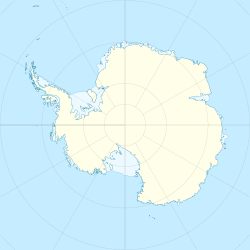Dismal Island facts for kids
|
Location in Antarctica
|
|
| Geography | |
|---|---|
| Location | Antarctica |
| Coordinates | 68°6′S 68°50′W / 68.100°S 68.833°W |
| Highest elevation | 60 m (200 ft) |
| Administration | |
| Administered under the Antarctic Treaty System | |
| Demographics | |
| Population | Uninhabited |
Dismal Island is a small island located in the cold, icy region of Antarctica. It's about 1.9 kilometres (1 nmi) long and stands about 60 metres (200 ft) high. Most of the island is covered in ice. It is the largest island in a group called the Faure Islands. These islands are found in Marguerite Bay, which is off the west coast of a larger area known as Graham Land.
Contents
Exploring Dismal Island
Dismal Island is part of the Faure Islands. This group of islands was first found and mapped in 1909. This discovery was made by the French Antarctic Expedition, 1908–10. The expedition was led by a brave explorer named Jean-Baptiste Charcot.
Why is it called Dismal?
The island got its unusual name in 1949. A group called the Falkland Islands Dependencies Survey visited and studied the area. They named it "Dismal" because it looked very lonely and lifeless. It seemed like a desolate place with no plants or animals living on it.
Where is Dismal Island?
Dismal Island is located in Antarctica, the southernmost continent on Earth. It's in Marguerite Bay, which is a large bay on the west side of the Antarctic Peninsula. This area is known for its extreme cold and vast ice sheets.
Life on the Island
Dismal Island is currently uninhabited. This means no people live there permanently. Its harsh, icy environment makes it a challenging place for life. However, the surrounding waters of Antarctica are home to many unique creatures. These include penguins, seals, and various types of whales.
Protecting Antarctica
Even though Dismal Island is small and icy, it is part of a very important region. Antarctica is protected by the Antarctic Treaty System. This international agreement makes sure that Antarctica is used only for peaceful scientific research. It also helps to protect the continent's unique environment and wildlife.


